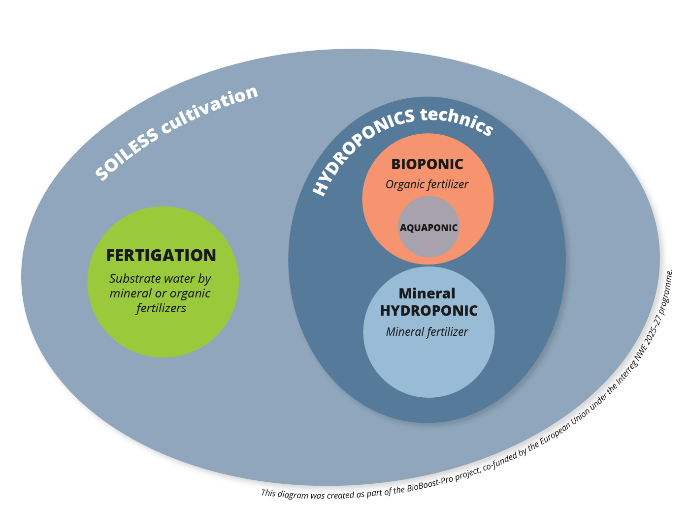As the BIOBOOST-PRO project begins in North-West Europe, co-financed by the Interreg NWE programme we address a crucial question : what exactly will be tested in the pilot sites ?
At the heart of the project lies a cultivation technique that is still relatively unknown but holds significant potential: bioponics.
BIOBOOST-PRO is co-financed by the European Union through the Interreg North-West Europe programme, which supports transnational cooperation to accelerate the transition towards more sustainable agricultural models. This funding makes it possible to test bioponics in diverse territorial contexts, to pool expertise, and to establish a shared knowledge base across the NWE region. The project is also co-financed by local authorities in partner regions, in line with the territorial co-financing mechanisms foreseen by Interreg to support on-the-ground implementation.
This article provides a clear overview of the concept, its origins, how it differs from conventional hydroponics, and how BIOBOOST-PRO will apply it to turn an agricultural challenge into a circular opportunity.
Bioponics: a circular soilless cultivation method emerging since the early 2000s
Bioponics is a relatively young term in scientific literature. It appeared discreetly in the early 2000s and has since grown in interest from 1 to 15 mentions : a clear signal that researchers and growers worldwide are turning their attention to circular soilless cultivation.
At the intersection of agronomy, ecology, and technical innovation, bioponics is defined as the cultivation of plants in an aqueous medium, fed exclusively by organic fertilizers derived from residual materials such as manure.
It addresses a central question: how can we reduce dependence on imported nutrients and improve the circularity of agricultural systems ?
Hydroponics, with circularity added
Although bioponics looks like hydroponics, the fundamental difference lies in the source of nutrients.
- Hydroponics:
Uses fully soluble mineral nutrient solutions. The composition is precise and controlled, but relies on limited or imported resources. - Bioponics:
Relies on organic fertilizers derived from agricultural waste : manure, digestate, organic fertilizers produced from manure.
The nutrients must be biologically mineralised before being absorbed by plants, which requires essential nitrification within the system.
For agricultural territories facing soil saturation, nutrient losses or a need to reduce dependence on imported fertilizers, this difference is significant.
Visual Overview

Turning manure into liquid organic fertilizer: how BIOBOOST-PRO will proceed
One of BIOBOOST-PRO’s core objectives is the demonstration, optimisation and modelling of bioponics under real-life conditions across its pilot sites.
The project foresees that pig, poultry and fish manure will be digested by technical partners, who already have the expertise required to convert these materials into organic fertilizers suitable for soilless cultivation. Digestion biologically transforms manure into a more stable, homogeneous and valuable product, with nutrients that are more easily mobilised by plants.
Collection and provision of manure
Pig, poultry or fish manure is supplied by partners involved in the pilots. For example, the Experimental Poultry Center collects and sends poultry manure to ULiège for the Belgian trials.
Manure digestion
Digestion is carried out:
- on-site, as in the ULiège pilot (Belgium), ASTREDHOR (France), the Land Centre/Cill Ulta pilot (Ireland), and by 3N for the mechanisation process ;
- or off-site, by a specialised partner such as 3N (Germany), ASTREDHOR (France) or INAGRO (Belgium), which digest the manure and then send the resulting organic fertilizers to the growing partner (Botany, NL).
Real-life testing in bioponic systems
The pilot sites analyse :
- plant growth,
- the performance of nutrients derived from manure,
- the effect of circular biostimulants (e.g. produced by TOOPI)
12 partners in North West Europe, 6 pilot sites
BIOBOOST-PRO brings together a transnational consortium of partners from five North-West European countries: ULiège (project lead), Inagro, the Experimental Poultry Center and Groupe One in Belgium; ASTREDHOR, TOOPI Organics and the University of Picardie Jules Verne in France; 3N and Trier University of Applied Sciences in Germany; Atlantic Technological University Galway and Cill Ulta in Ireland; as well as Botany in the Netherlands. Together, they are implementing six bioponic pilot sites across the NWE region.
An opportunity to disseminate a circular soilless cultivation method
This represents the opportunity to replace certain petrochemical mineral fertilizers, often imported and containing finite or energy-intensive nutrients, with circular organic fertilizers.
Follow us on our social media channels to stay updated on the project’s progress :